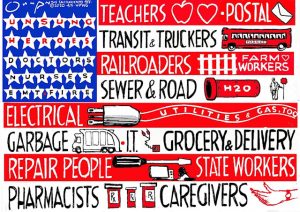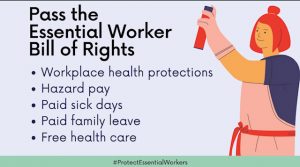Essential Workers Bill of Rights
April 13, 2020Help us become a community that vulnerably shares each other’s burdens and the weight of glory. Listen to our hearts’ longings for the healing of our world.
-Richard Rohr
The pope just proposed a ‘universal basic wage.’ What does that mean for the United States?
Pope Francis encouraged activists to keep up their efforts and their hope under the pressure of a pandemic. He repeated familiar refrains about the “idolatry of money” and “ecological conversion.” But he also allowed himself to offer a single policy proposal that movements might work toward: “This may be the time,” he said, “to consider a universal basic wage.” This points unmistakably to what is usually known as universal basic income—a regular, substantial cash payment to people just for being alive.
There is some disagreement about the pope’s precise meaning, but he does indicate that “this may be the time” for considering a new strategy for economic inclusion. He also mentioned “basic income” in passing last month during a meeting with finance ministers.
Why is the head of the Roman Catholic Church advocating a little-tested, still-radical economic policy?
It would not be the first time. Modern Catholic social teaching began with Pope Leo XIII’s encyclical “Rerum Novarum” in 1891, which sought to address the widening economic inequality of that Gilded Age—one not so unlike ours. Leo sought a response to the conflicts between labor and capital that rejected the absolutist tendencies of each.
Pope Francis spoke to the need for universal access to work, alongside housing, land and food. But several times, he also emphasized the kinds of work that go unnoticed and unwaged.
https://www.americamagazine.org/politics-society/2020/04/12/pope-just-proposed-universal-basic-wage-what-does-mean-united-states via @americamag


